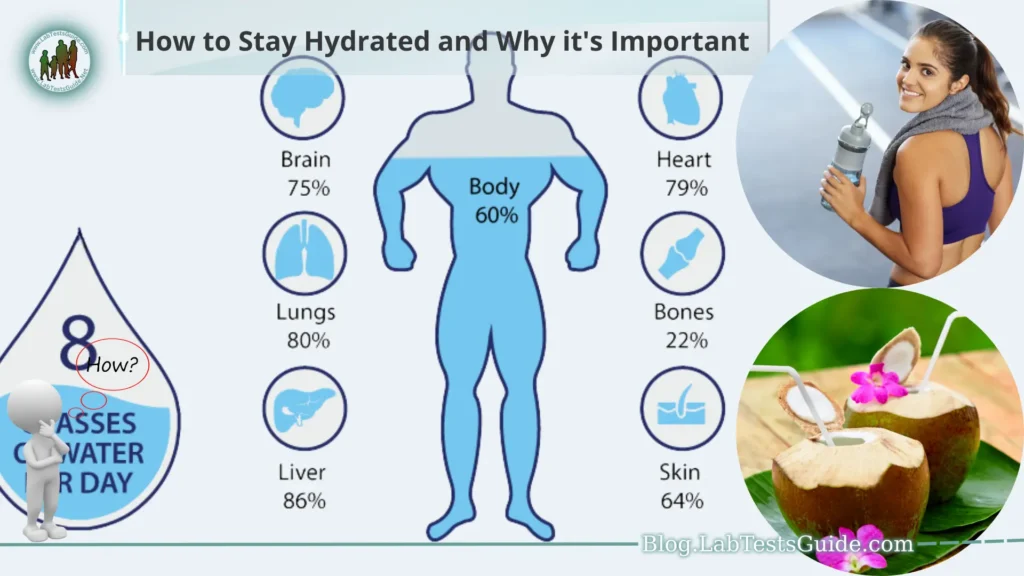Proper hydration is essential for maintaining overall health and well-being. Water plays a crucial role in various bodily functions, and staying hydrated is vital for our bodies to function optimally. In this guide, we will explore the importance of hydration, the signs and consequences of dehydration, factors affecting hydration, recommended daily water intake, practical tips for staying hydrated, and the benefits of maintaining proper hydration levels. Whether you’re an athlete, a busy professional, or simply someone looking to improve their health, this guide will provide you with valuable insights on how to stay hydrated and why it matters. So, let’s dive in and discover the key to keeping our bodies hydrated and healthy.

Understanding Hydration:
What is hydration?
Hydration refers to the process of maintaining an adequate amount of water in the body. It involves the balance between water intake and water loss. When we consume fluids, our bodies absorb water, which is then distributed to cells, tissues, and organs to support their functions.
- The importance of water in the body: Water is vital for the proper functioning of almost every system in our bodies. It serves several essential purposes, including.
- Regulating body temperature: Water helps regulate body temperature by enabling sweat production and cooling through evaporation.
- Lubricating joints and cushioning organs: Adequate hydration ensures that joints are well-lubricated, reducing friction and supporting smooth movement. It also helps protect and cushion vital organs.
- Transporting nutrients and oxygen: Water acts as a medium for transporting nutrients, oxygen, and other essential substances throughout the body via the bloodstream.
- Facilitating digestion and waste elimination: Sufficient water intake aids digestion by breaking down food, absorbing nutrients, and promoting regular bowel movements to eliminate waste products.
- Supporting brain function: The brain relies on proper hydration to maintain optimal cognitive function, including concentration, alertness, and memory.
- Promoting healthy skin: Water plays a vital role in maintaining skin hydration, elasticity, and overall appearance.
Signs and Consequences of Dehydration:
- Common signs of dehydration: Dehydration can manifest in various ways, and it’s important to recognize the early signs to address it promptly. Some common signs of dehydration include.
- Thirst: Feeling thirsty is one of the initial signs of dehydration. It indicates that your body needs more fluids.
- Dry mouth and lips: When you’re dehydrated, your mouth may feel dry, and your lips may become chapped or cracked.
- Dark urine: Urine color can be an indicator of hydration levels. If your urine is dark yellow or amber, it suggests concentrated urine due to dehydration.
- Fatigue and dizziness: Dehydration can cause fatigue, weakness, and dizziness, making it difficult to perform daily activities.
- Headache and difficulty concentrating: Inadequate hydration can lead to headaches and difficulty concentrating or focusing on tasks.
- Dry skin and reduced sweat: Dehydration can cause dry skin, decreased elasticity, and reduced sweating, affecting the body’s ability to cool down.
- Health risks of dehydration: Failure to maintain proper hydration can have negative consequences on your health. Some potential health risks of dehydration include.
- Impaired physical performance: Dehydration can decrease endurance, strength, and overall physical performance, making exercise and daily activities more challenging.
- Heat-related illnesses: In hot environments or during intense physical exertion, inadequate hydration can increase the risk of heat exhaustion or heatstroke.
- Kidney problems: Insufficient water intake may contribute to the formation of kidney stones and urinary tract infections.
- Digestive issues: Dehydration can lead to constipation and digestive discomfort, as water is crucial for proper digestion and bowel movements.
- Impaired cognitive function: Inadequate hydration can negatively impact cognitive function, including memory, attention, and decision-making abilities.
- Increased risk of certain conditions: Chronic dehydration has been associated with an increased risk of urinary tract infections, kidney disease, and certain cardiovascular conditions.
Factors Affecting Hydration:
Here are some key factors that can affect hydration levels.
- Climate and temperature: Hot and humid climates increase the body’s need for hydration due to higher levels of perspiration and increased fluid loss through sweating. In such conditions, it is important to drink more fluids to compensate for the increased water loss.
- Physical activity: Engaging in physical activity, especially intense or prolonged exercise, leads to increased fluid loss through sweating. Sweating helps cool the body, but it also depletes water and electrolytes. It is crucial to replenish fluids during and after physical activity to maintain hydration.
- Age and health conditions: Certain age groups and health conditions may affect hydration requirements. For example, infants and young children have higher water needs relative to their body weight compared to adults. Older adults may have a reduced sense of thirst and may require conscious efforts to maintain hydration. Medical conditions such as diabetes or kidney disease can also impact hydration levels and fluid balance.
Daily Water Intake Recommendations:
Here are some general guidelines for daily water intake.
- General guidelines: The National Academies of Sciences, Engineering, and Medicine provides general recommendations for daily water intake, which include:
- For adult men: Approximately 3.7 liters (or about 13 cups) of total water intake per day. This includes water from beverages and foods.
- For adult women: Around 2.7 liters (or about 9 cups) of total water intake per day. Again, this includes water from beverages and foods.
Adjustments for different situations:
Several situations may require adjustments to daily water intake.
- Climate and physical activity: Hot and humid climates or engaging in intense physical activity may increase water needs. It is important to drink more fluids in these situations to replace the extra water lost through sweating.
- Illness or certain health conditions: Some health conditions, like fever, diarrhea, or vomiting, may increase fluid loss and require increased water intake to prevent dehydration. Consult with a healthcare professional for specific guidance in these cases.
- Pregnancy and breastfeeding: Pregnant and breastfeeding women typically have higher water needs. It is recommended that they consult with healthcare providers for personalized recommendations.
Tips for Staying Hydrated
Here are some practical tips to help you stay hydrated.
- Drink plenty of water: Make water your go-to beverage throughout the day. Keep a reusable water bottle with you and sip on water regularly. Set reminders if needed to ensure you’re consistently drinking water.
- Eat water-rich foods: In addition to drinking water, consume foods with high water content, such as fruits (watermelon, strawberries, oranges), vegetables (cucumbers, lettuce, celery), and soups. These foods can contribute to your overall hydration.
- Limit caffeine and alcohol consumption: Caffeine and alcohol can have a diuretic effect, increasing fluid loss and potentially leading to dehydration. If you consume these beverages, do so in moderation and balance them with adequate water intake.
- Set reminders and establish a routine: Create reminders or use smartphone apps to prompt you to drink water at regular intervals. Establish a hydration routine by drinking water when you wake up, before meals, during physical activity, and before bedtime.
- Carry a water bottle with you: Having a water bottle with you at all times makes it convenient to drink water throughout the day, whether you’re at work, running errands, or exercising.
- Flavor your water: If plain water becomes monotonous, infuse it with natural flavors by adding slices of fruits like lemon, lime, or cucumber. This can make water more enjoyable and encourage increased consumption.
- Monitor your urine color: Pay attention to the color of your urine. Aim for pale yellow or clear urine, which generally indicates good hydration. If your urine is dark, it’s a sign that you need to drink more water.
- Be mindful during exercise and in hot weather: During physical activity or exposure to hot weather, drink water before, during, and after to replace fluids lost through sweat. Take frequent breaks to hydrate, even if you don’t feel thirsty.
Benefits of Staying Hydrated
Here are some key advantages of maintaining proper hydration.
- Improved physical performance: Proper hydration enhances physical performance and endurance. It helps maintain muscle function, lubricates joints, regulates body temperature, and delivers oxygen and nutrients to working muscles, enabling you to perform better during exercise or physical activities.
- Enhanced cognitive function: Hydration plays a crucial role in maintaining optimal brain function. Studies have shown that even mild dehydration can impair cognitive abilities, such as memory, attention, and concentration. By staying hydrated, you can promote better cognitive performance and mental clarity.
- Better digestion and nutrient absorption: Adequate water intake supports healthy digestion by promoting the breakdown of food and the absorption of nutrients in the gastrointestinal tract. It helps prevent constipation and ensures the smooth movement of waste through the intestines.
- Healthy skin and overall well-being:Proper hydration contributes to healthy, glowing skin. It helps maintain skin elasticity, promotes cell turnover, and flushes out toxins. Additionally, staying hydrated can boost energy levels, improve mood, and support overall well-being.
FAQs:
Why is staying hydrated important?
Staying hydrated is essential because water is vital for numerous bodily functions. It helps regulate body temperature, transport nutrients, remove waste, cushion joints, and support various metabolic processes. Dehydration can lead to various health issues, including headaches, fatigue, kidney stones, and in severe cases, heat-related illnesses.
How much water should I drink each day?
The recommended daily water intake varies from person to person. A general guideline is to aim for about 8 cups (64 ounces) of water per day, but individual needs depend on factors like age, sex, activity level, and climate. Many health experts recommend using the “8×8” rule as a starting point—eight 8-ounce glasses of water daily.
What factors can affect my hydration needs?
Your hydration needs can be influenced by various factors, such as physical activity, climate, humidity, and overall health. If you’re physically active or in a hot environment, you may need more water to compensate for sweat loss.
Can I meet my hydration needs with beverages other than water?
Yes, you can meet your hydration needs with a variety of beverages, including water, herbal teas, milk, and even some fruits and vegetables with high water content (e.g., watermelon, cucumber). However, it’s essential to limit or avoid sugary and caffeinated beverages, as they can contribute to dehydration.
How can I tell if I’m properly hydrated?
You can monitor your hydration by checking the color of your urine. Pale or light yellow urine usually indicates adequate hydration, while dark yellow or amber urine may suggest dehydration. Additionally, thirst is a natural indicator of your body’s need for fluids.
What are the signs of dehydration?
Signs of dehydration can include dry mouth, dry skin, dark urine, dizziness, rapid heartbeat, fatigue, and in severe cases, confusion or fainting. It’s crucial to address these symptoms promptly by increasing your fluid intake.
Are there certain populations at higher risk of dehydration?
Yes, some individuals are at a higher risk of dehydration, such as older adults, infants, athletes, and people with certain medical conditions (e.g., kidney stones, diabetes). These groups may need to pay closer attention to their hydration needs.
How can I stay hydrated during exercise?
To stay hydrated during exercise, drink water before, during, and after your workout. The amount you need depends on the intensity and duration of your exercise. Sports drinks with electrolytes may be beneficial for prolonged, intense activities.
Can I drink too much water?
While it’s essential to stay hydrated, excessive water intake can lead to a condition called hyponatremia, where the balance of electrolytes in your body is disrupted. It’s relatively rare but can be dangerous. Listen to your body’s cues and avoid overhydration.
Conclusion
In conclusion, staying hydrated is essential for maintaining overall health and well-being. Water is involved in numerous bodily functions and is necessary for proper digestion, circulation, temperature regulation, nutrient absorption, and elimination of toxins. It is recommended to drink an adequate amount of water each day, which may vary depending on individual factors. Pay attention to your body’s thirst cues and increase your water intake during physical activity or in hot environments. Additionally, incorporating water-rich foods into your diet can help supplement your hydration. By prioritizing hydration, you can support your body’s optimal functioning and promote your overall health.






